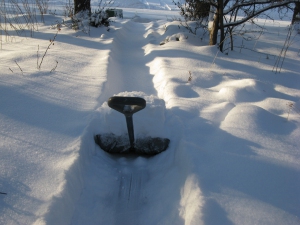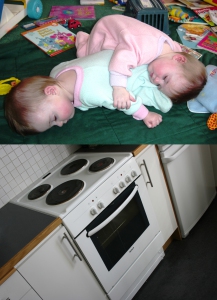
You can get quite hot doing this. There’s a very easy way to cool off. (Flickr)
I told a friend that I was working on an essay, and she made a guess about what the title was. I told her the real title and she replied, “Cuz everyone don’t wanna see a bare ass Will Matheson frolicking in the snow?”
Hard to argue with that.
I have another friend, who lives in rural Nova Scotia, who speaks to the elder incumbents frequently:
“If I have learned anything out here, it’s that older people in the country really hate if someone is being a dick to other people for no reason. ‘Why can’t people all just mind their own business? It’s like a disease that is spreading or something,’ says the good neighbour.”
Privacy is, at least in part, a protection from individual-society disagreement. This is why we have naturist habitats in secluded locations. This is why parties with alcohol in Iran happen on the downlow. This is why networks of drug production and distribution are kept secret. Yes, this is also why, say, botnet-running blackmailers stay in the shadows, too, but I think it’s important that we reflect on what, if anything, makes our purges special, aside from the fact that they’re ours.
For the many things that aren’t networks of baby theft, cooking, and meat distribution, we should consider privacy as a crude, temporary measure, but not necessarily a thing to attack. It is a queue into which we can place things to be reconciled with public life later. Ideally, it protects what is conscionable among a minority from the absolutist tyranny of the majority.1

Babies, Stove – These things should never never ever ever go together oh gawd I’m gonna get struck by lightning just for uploading this. (Wikipedia, Wikipedia)
The more society would drive a practice, benign or not-so-benign, underground, the more exacerbated the harmful effects become – provided, that is, there even are any. For example, young people might have a greater innate risk of alcohol poisoning, but their holding parties in secret must increase this risk. For one thing, few adults will subject themselves to the legal and social risks of monitoring such parties. For another, calling for an ambulance means everything is busted.2
And yet millions of teenagers go on drinking, with few or no lasting effects to speak of. You there – yes, you – did you drink when you were a teenager? For the love of crumbcake, tell the world! I didn’t drink when I was a teenager, but I didn’t hesitate to shame people who did. I regret the second thing. My objections were ungroundedly moral – it’s wrong because the Judeo-Christian-Dr. Laura morality corpus says it’s wrong, it’s wrong because alcohol is dangerous. I no longer care about the first, and in this essay I’m going to undermine the second as a reason to prohibit it, even though, really, alcohol is still dangerous.
Or, more likely, the tyranny of a para-religious minority that few have the gumption to openly question. But we also enable them by forcing fundamentalism on each other. ↩
Robby Soave writes about this at Reason.com as it applies to US colleges. The legal drinking age in the United States is an absurd 21. ↩
